Using neutral language, a new poll of 1,000 likely voters conducted November 1-3 by Pulse Opinion Research for the Center for Immigration Studies shows that the public wants immigration laws enforced, and the level of legal immigration reduced. Unlike many other polls, which give the public the false choice of mass deportation or a "path to citizenship", this poll asked respondents if they support causing illegal immigrants to leave the country by enforcing the law. A majority of the public supported this approach; and a majority or plurality supported it among almost all demographic groups, including Hispanics. Moreover, a majority of Americans want a level of legal immigration significantly lower than the current level; few want the kinds of increases contained in the Gang of Eight bill from 2013.
This poll helps explain why Donald Trump has remained as popular as he has, despite many missteps, insensitive comments, and other revelations. Trump's emphasis on enforcement clearly resonates with Americans, even if he has sometimes been careless in discussing the issue.
Among the findings:

- Most Americans (54 percent) believe there has been "too little effort" to enforce immigration laws; just 12 percent think there has been "too much effort", and 20 percent think efforts have been "just right". The totals reported in the bullets below do not necessarily equal 100 percent because some people responded that they were not sure about their answer to a question.
- The popularity of enforcement can also be seen when people were asked what they thought should be done first about illegal immigration: 58 percent of respondents said that we should first "require employers to verify the legal status of their workers". Only 35 percent responded we should first "give them work permits and put them on a path to citizenship".
- Of likely voters, 56 percent of likely voters support causing illegal immigrants to return to their home countries by penalizing employers, getting cooperation from local law enforcement, and denying welfare benefits. Only 30 percent were opposed to this approach.
- The above results avoid the false option of mass deportation, which is often offered as an option in such polls. No major pro-enforcement organization or public official, such as Sen. Jeff Sessions (R-Ala.) or Rep. Mo Brooks (R-Ala.), or even Donald Trump's finalized position supports a policy of mass deportation.1
- On legal immigration, when asked how many legal immigrants should be admitted, 54 percent of respondents picked 500,000 a year or fewer as the level they would prefer — about half the number currently allowed into the country. Just 11 percent wanted the current level of immigration of one million a year; and another 11 percent wanted more than one million a year.
- The new survey includes detailed breakdowns by various demographic characteristics, including race, gender, age, ideology, party, and income.
- One interesting finding is that a large share of Hispanics support enforcing immigration laws. Of likely Hispanic voters, 51 percent responded that efforts to enforce the law have been "too little", compared to 38 percent who indicated that it was "too much" or "just right".
- Among Hispanics, 49 percent indicated that they would support a policy of causing illegal immigrants to return home by enforcing the law, compared to 36 percent who opposed such a strategy.
- However, Hispanics were almost evenly split on whether we should require employers to verify legal status first (48 percent) or first give illegal immigrants work permits and a path to citizenship first (50 percent).
- On legal immigrants, 52 percent of Hispanic voters indicated that they wanted to allow 500,000 or fewer legal immigrants in to the country each year, about half the current level. Just 9 percent wanted to allow in one million legal immigrants a year, which is the current level; and just 13 percent wanted it increased above the current level of one million a year. Like other voters, about one-quarter of Hispanics said they were unsure about this question.
Methods
The national survey of 1,000 likely voters was conducted by Pulse Opinion Research November 1-3, 2016. Pulse Opinion Research LLC is an independent public-opinion research firm using automated polling methodology and procedures licensed from Rasmussen Reports LLC. The margin of sampling error was +/- 3.0 percentage points, with a 95 percent level of confidence. Pulse Opinion Research did not develop the questions or the subject matter for this survey, but may have suggested edits.
The survey was conducted using an established automated polling methodology. Eighty percent of the sample calls were placed to randomly selected phone numbers through a process that ensures appropriate geographic and age representation. Twenty percent of the sample was conducted via online surveys of individuals who use a cell-phone as their primary telephone. After the calls and online surveys were completed, the raw data was processed through a weighting program to ensure that the sample reflects the overall population in terms of age, race, gender, political party, and other factors. This processing step is required because different segments of the population answer the phone in different ways.
The population targets were based on Census Bureau data, a series of screening questions to determine likely voters, and other factors. Pulse Opinion Research determines its partisan weighting targets through a dynamic weighting system that takes into account voting history, national trends, and recent polling.
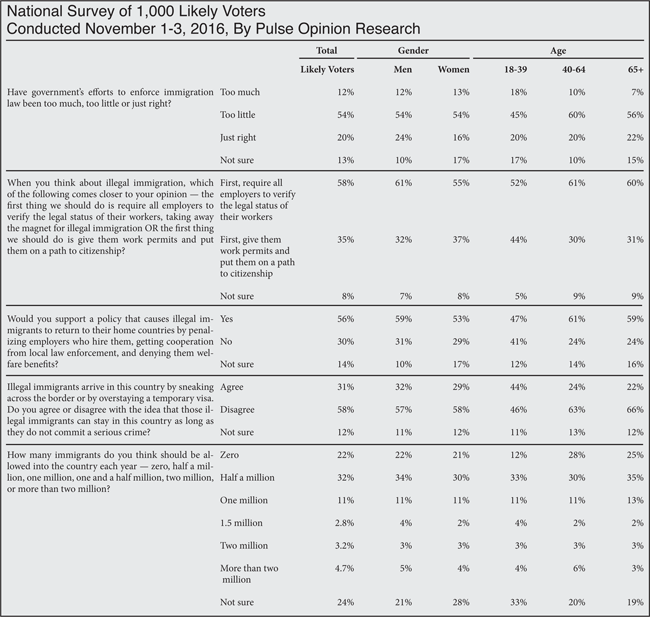
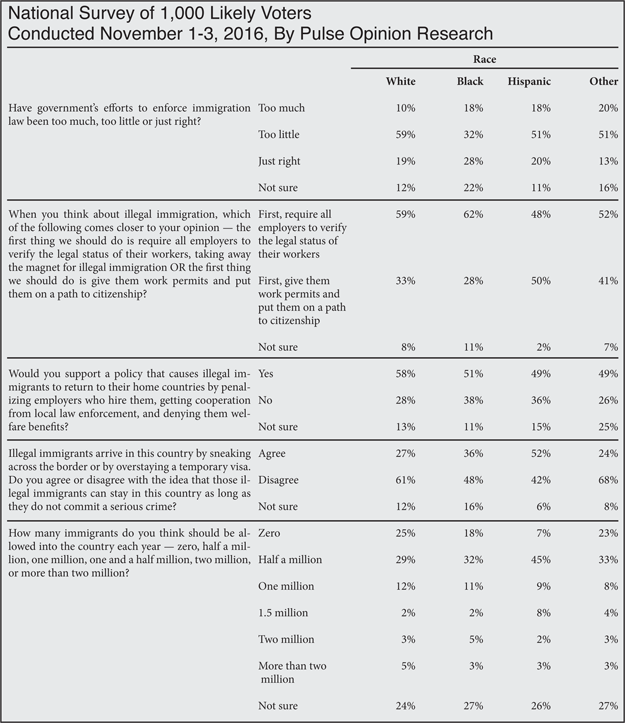
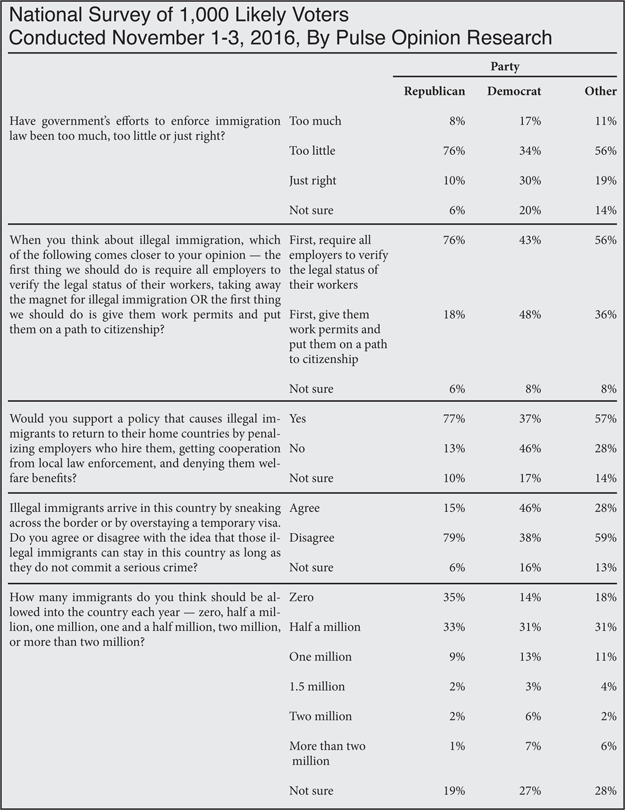
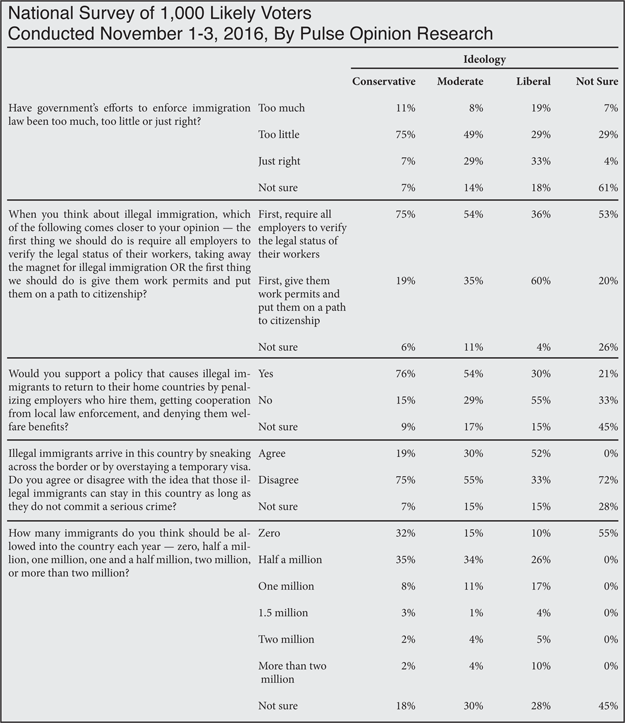
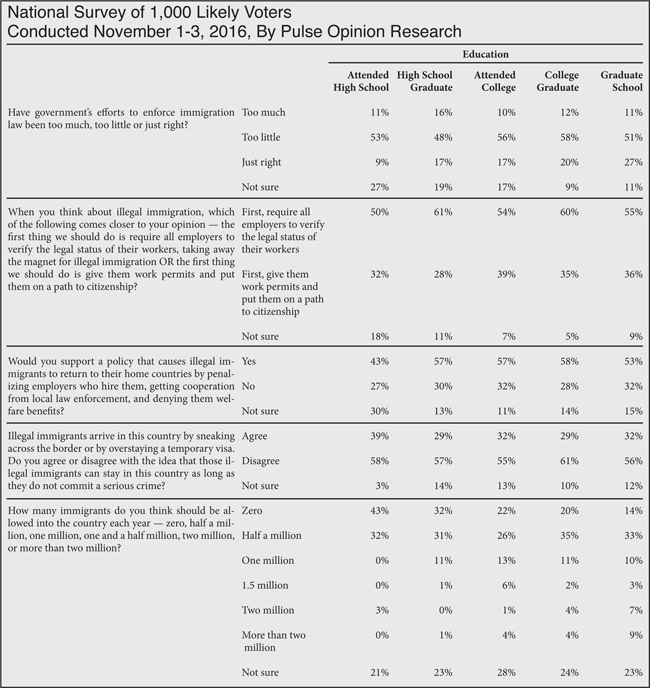
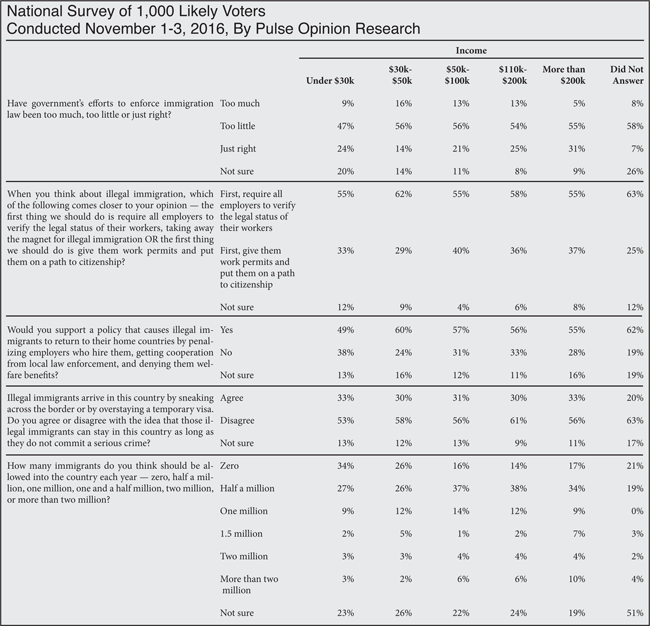
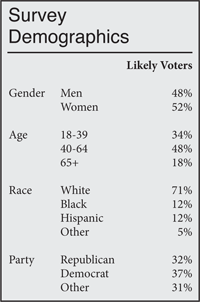
End Note
1 Although some of Trump's comments seem to indicate that he favors large-scale deportations as the centerpiece of his enforcement strategy, as his position has developed he has indicated that he wants to reduce the illegal population by enforcing the law, including going after employers who hire illegal immigrants. In his major immigration speech on August 31 in Phoenix, he said: "In several years, when we have accomplished all of our enforcement goals — and truly ended illegal immigration for good, including the construction of a great wall, and the establishment of our new lawful immigration system — then and only then will we be in a position to consider the appropriate disposition of those who remain." After the speech, the Washington Post noted that Trump's off-the-cuff rhetoric was often at odds with his official campaign positions, which led to confusion over the deportation issue.
